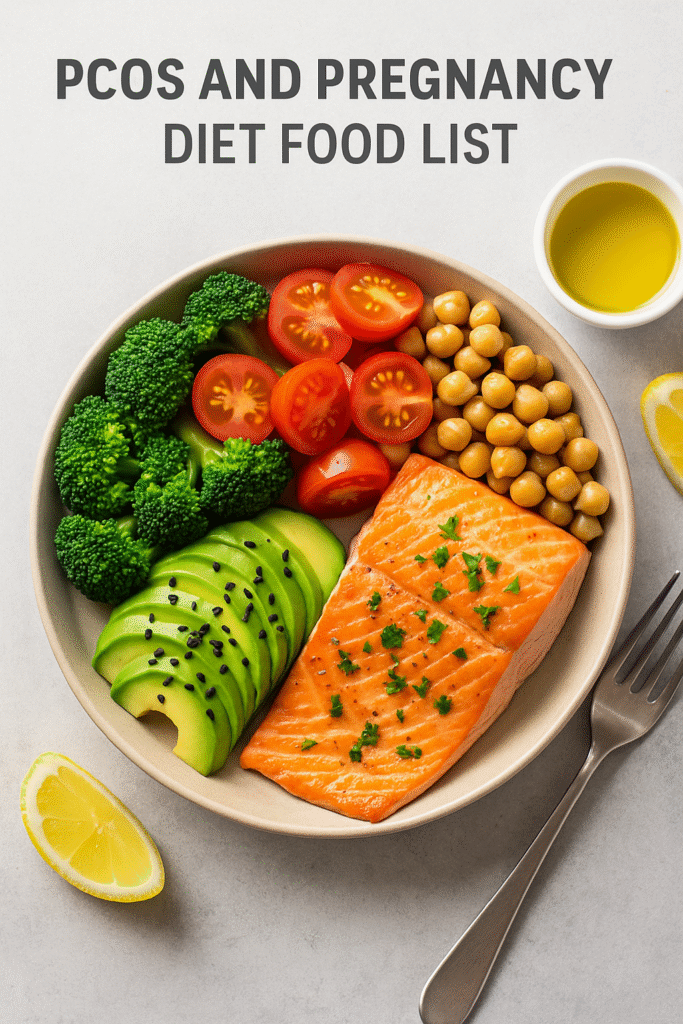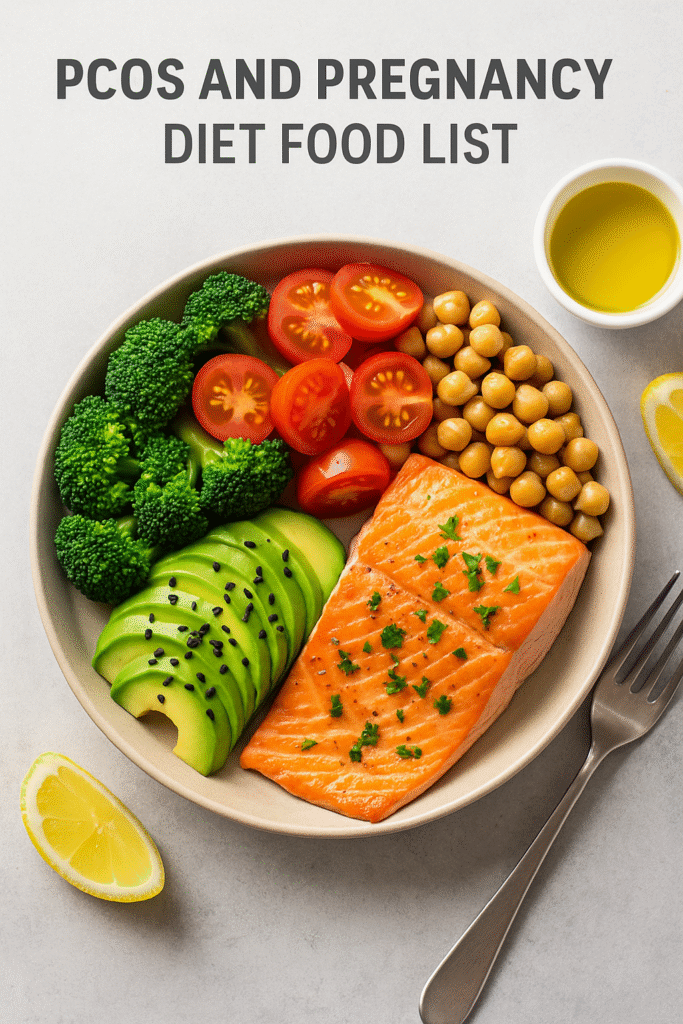Table of Contents
- Introduction
- Understanding PCOS and Its Impact on Fertility
- Success Rate of Pregnancy with PCOS
- Real-Life PCOS Pregnancy Success Stories
- Key Challenges Women Face with PCOS Pregnancy
- Role of Diet in Managing PCOS for Fertility
- Top Fertility-Boosting Foods for Women with PCOS
- Foods to Avoid When Trying to Conceive with PCOS
- Sample Daily PCOS Fertility Meal Plan
- Lifestyle Tips Beyond Diet
- Frequently Asked Questions (FAQs)
- Conclusion
1. Introduction

Polycystic Ovary Syndrome (PCOS) is a hormonal disorder that affects nearly 1 in 10 women of reproductive age. For many women, PCOS creates both emotional and physical challenges, especially when it comes to fertility and pregnancy. But there’s good news: with the right strategies—particularly in diet and lifestyle—many women with PCOS go on to have healthy pregnancies.
This article explores the real success rates of pregnancy in women with PCOS, shares inspiring stories, outlines the challenges, and most importantly, provides a science-backed dietary guide to improve your chances of conception.
2. Understanding PCOS and Its Impact on Fertility
PCOS disrupts hormonal balance, leading to irregular ovulation, elevated androgen levels, and insulin resistance. These symptoms directly affect fertility, often making it difficult to conceive naturally. Common symptoms include:
- Irregular periods
- Excess hair growth (hirsutism)
- Acne and oily skin
- Obesity or difficulty losing weight
- Cysts on the ovaries
Ovulation irregularities are one of the main reasons PCOS leads to infertility, but the good news is that many of these issues can be managed through diet and lifestyle interventions.
3. Success Rate of Pregnancy with PCOS
Despite the challenges, many women with PCOS conceive successfully. Studies show:
- If under 35 and ovulating, chances of natural pregnancy within a year are up to 70-80%.
- With proper lifestyle changes, including weight loss and insulin control, fertility improves significantly.
- Assisted reproductive technologies (ART), such as IVF, have high success rates among PCOS patients.
Key factors that improve pregnancy outcomes include:
- Maintaining a healthy BMI
- Reducing insulin resistance
- Regulating menstrual cycles naturally
4. Real-Life PCOS Pregnancy Success Stories
Story 1: A 28-Year-Old Woman Who Conceived After 3 Months of Diet Change
Sarah struggled with irregular cycles and acne. She followed a high-protein, low-sugar diet, added walking to her routine, and started taking inositol supplements. Within 3 months, her cycles became regular—and she conceived naturally!
Story 2: Overcoming 5 Years of Infertility
Another user shared on Quora how she fought PCOS-induced weight gain and low self-esteem. After visiting a PCOS-specialist who guided her through a structured diet and stress management plan, she lost 20 kg and became pregnant naturally within 6 months.
These stories prove that with the right steps, pregnancy with PCOS is possible.
5. Key Challenges Women Face with PCOS Pregnancy
- Irregular ovulation or anovulation
- Insulin resistance leading to hormonal imbalances
- Increased risk of miscarriage
- Higher chance of gestational diabetes
- Emotional stress and anxiety
Understanding these risks can help you take preventive measures and seek the right support.
6. Role of Diet in Managing PCOS for Fertility
Diet plays a crucial role in managing insulin resistance, reducing inflammation, and promoting hormonal balance. Here’s how:
- Low-GI foods prevent sugar spikes
- Anti-inflammatory foods lower chronic inflammation
- Fiber improves hormone detoxification
- Protein keeps blood sugar stable
7. Top Fertility-Boosting Foods for Women with PCOS
Here’s a list of PCOS insulin resistance diet foods that support hormonal health and fertility:
| Food | Benefits |
|---|---|
| Leafy Greens | Rich in folate & antioxidants |
| Berries | Anti-inflammatory, high in fiber |
| Avocados | Healthy fats for hormone production |
| Eggs | Rich in protein and nutrients |
| Salmon | Omega-3s for inflammation control |
| Lentils & Beans | Plant protein and fiber |
| Nuts & Seeds | Healthy fats and zinc |
| Whole Grains | Steady blood sugar control |
Make these foods part of your daily diet to support ovulation and reproductive health.
8. Foods to Avoid When Trying to Conceive with PCOS
- Refined sugars and carbs (white bread, cakes)
- Processed meats and fried foods
- Sugary drinks and sodas
- Dairy with added hormones
- Excess caffeine
- Alcohol
These foods can worsen inflammation, disrupt hormones, and spike insulin levels.
9. Sample Daily PCOS Fertility Meal Plan
Breakfast: Oatmeal with chia seeds, blueberries, and almond milk
Snack: Handful of walnuts and green tea
Lunch: Grilled salmon salad with avocado, kale, and olive oil
Snack: Hummus with cucumber sticks
Dinner: Lentil stew with brown rice and steamed broccoli
Dessert: A few squares of dark chocolate (70%+)
This meal plan supports blood sugar stability and hormone balance throughout the day.
10. Lifestyle Tips Beyond Diet
- Exercise regularly: Focus on walking, strength training, or yoga
- Sleep 7–9 hours: Helps regulate hormones
- Reduce stress: Through journaling, prayer, meditation, or hobbies
- Take supplements: Inositol, omega-3, and vitamin D have shown promise
- Track ovulation: Use apps or ovulation kits to know your fertile window
11. Frequently Asked Questions (FAQs)
Q1: Can I get pregnant naturally with PCOS?
Yes, many women do, especially if they ovulate regularly and follow a PCOS-friendly lifestyle.
Q2: How long does it take to conceive with PCOS?
It varies, but with proper management, most women conceive within 6–12 months.
Q3: Should I lose weight to get pregnant with PCOS?
Yes, even a 5-10% weight loss can improve ovulation and hormonal balance.
Q4: What diet is best for PCOS and fertility?
A low-GI, anti-inflammatory diet rich in whole foods and healthy fats.
12. Conclusion
Pregnancy with PCOS is absolutely possible. While it may come with its challenges, managing your lifestyle—especially your diet—can significantly increase your chances of a healthy conception. The journey may be emotional, but countless women have walked this path successfully.
Explore our full PCOS Diet Plan for Hormonal Balance to get a detailed guide on what to eat and how to live better with PCOS.


Pingback: Detox Water for Losing Weight: 7 Amazing Recipes to Burn Fat Naturally